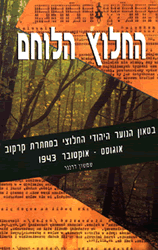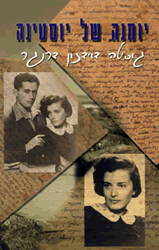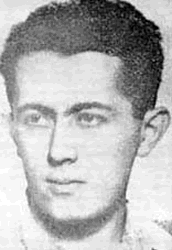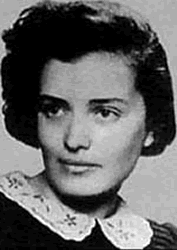
A book about the newspaper " the Fighting Chalutz" written
by the Jewish Undergraound in 1943

The Diary of Gusta Davidson Draenger, also known by her
underground name, Justyna
She was the soul of the conspiratorial undertaking
Josef Wolf Gusta Davidson Draenger, also known by her underground name, Justyna,
was a leader in the Krakow resistance. She secured hiding places for
partisan fighters, accompanied partisan fighting groups to the forest,
and smuggled guns. Gusta wrote her extraordinary account of the Krakow
resistance organization and her activities in it, from a prison cell
after her capture. The resulting memoir Justyna's Narrative was
written on bits of toilet paper between interrogations, during which
she suffered extreme physical and psychological torture at the hands
of the Gestapo. Gusta's diary was hidden in the cell, and then
smuggled out in folded triangles. Josef Wolf, in his introduction to
Justyna wrote of Gusta in 1945: "She was the soul of the
conspiratorial undertaking, not one of the fighting deeds successfully
undertaken could have been accomplished without her inspiration and
work."65 The women in the Krakow resistance established a network of private
dwellings around the forests, each of them furnished and supplied so
movement operatives could inhabit them. Fighters left the forest after
each action taken against the Nazis and lived in these dwellings.
Gusta wrote that this mission was assigned to "Evea, Klara, and Hela,
who sought out appropriate living quarters, helping the resistance to
act as a 'self-sustaining entity.'"66 Gusta died in a skirmish with the Germans in the Wisnicz forest
outside of Krakow. She and her husband's deaths on November 8, 1943
ended the activities of the ZOB in Krakow
Justyna's Narrative (Hardcover)
by Justyna (Author), Gusta Davidson Draenger (Author), Eli Pfefferkorn
(Editor), David H. Hirsch (Editor), Roslyn Hirsch (Translator) --------------------------------------------------------------------------------
Editorial Reviews From Publishers Weekly
Nonfiction about the Holocaust should be judged on two levels: Does it
add to our understanding of this horrific event? And is it a
compelling piece of writing? This account of young Jewish underground
freedom fighters in Krakow is an equivocal success on both levels, one
marred only by its sometimes excessively lofty language and its lapses
of continuity. Considering that it was composed on smuggled scraps of
paper in a Polish prison by a woman who knew she would not survive the
war, we are fortunate to have it at all. Originally published in
Poland in 1946, this is the first English translation of the work. In
order to protect her fellows, Gusta adopts pseudonyms for herself
("Justyna") and her husband, and she also writes about their exploits
in the third person. Justyna relates how the underground formed, held
secret meetings, organized false identity papers and worried about
whether even a successful uprising could have more than symbolic
value. They had managed to get hold of five firearms, including a
Browning with which they planned to ambush six men, collect another
six weapons and arm six more comrades. This was not to be, as Justyna
regretfully writes of the failed guerrilla action. A few of their
group survived Nazi atrocities, but the author and her husband were
killed at some point after they escaped from the Polish prison.
Although somewhat weakened by choppiness and grandiose prose, this is
still a remarkable record of spirit and resistance.
Copyright 1996 Reed Business Information, Inc. --This text refers to
the Paperback edition. From Booklist
Draenger's incredible memoir was first published in Polish in 1946.
The text was compiled from scraps of paper written by Draenger, a
25-year-old Polish Jew, from February to April 1943, while she was an
inmate in the Montelupich Prison in Krakow. Draenger's narrative of
the resistance movement offers readers an understanding of the spirit
that motivated members of the Akiba Youth Movement; the author and her
husband were among the group's leaders. Draenger describes the
smuggling of arms from Warsaw, the ambushing of German soldiers, and
the fate that befell resistance fighters in the forest. She and her
husband escaped from the prison on April 29, 1943, but they were
killed by the Germans within a year. This English edition includes
additional transcriptions of original scraps that were found in the
archive of the Ghetto Fighters Kibbutz in Israel. The new material,
never before published, gives fuller expression to Draenger's romantic
idealism. George Cohen From Kirkus Reviews
The memoir of a young Jewish resistance fighter, written in a Polish
prison during WW II shortly before the author's escape--and death. All
Holocaust narratives are sad, but some are more profoundly moving than
others--for example, the story of Draenger. Justyna (her resistance
alias) was 25 years old when she penned this narrative in 1943, after
turning herself in to the Polish police to be with her husband, who
had been captured. She was repeatedly tortured by the Gestapo, but
despite her suffering, and with the help of her fellow women inmates,
she managed to write her story on scraps of toilet paper sewed
together with threads ripped from the prisoners' clothing. In it she
tells of her activities in the Jewish youth resistance: how young men
and women in their teens and twenties fought valiantly with few
weapons and little hope of victory against the most terrible killing
machine in humanity's history; of their dreams and ponderings, their
suffering and joy. Draenger's story is tragic, first, because she and
the people she wrote about were young and courageous, and most of them
died horribly at the hands of the Nazis. But the narrative is also sad
because it does not always do justice to the remarkable effort devoted
to creating it, nor to the amazing woman who wrote it. Draenger wanted
the memoir to be literary, but with no chance to edit what she wrote
under such horrible circumstances, the result is often disjointed. And
because she was writing a ``heroic narrative,'' she turned all of her
characters into stock figures instead of the true-to-life heroes they
were. She and her husband rejoined the underground after escaping from
prison and died while fighting the Nazis. Reading her final words, one
is most affected by the thought of what this exceptional woman might
have done had she lived in a different time and a better place. (10
illustrations, not seen) -- Copyright (c)1996, Kirkus Associates, LP.
All rights reserved. Language Notes
Text: English (translation)
Original Language: Polish |


Justyna Dawidson was born in Krakow in 1917. By 1938 she was one of
the leaders of the Akiva movement. After the occupation of Poland by
the German Army in September 1939, she helped establish the He-Haluts
Ha-Lohem, and underground combat group in Krakow. The following year
she married another member of the group, Shimshon Draenger.
In January 1943 Shimshon was arrested. She now surrendered to the
Gestapo, as both had pledged to do if either was seized. While in
Montelupich Prison she wrote about her experiences in the form of a
diary. These were smuggled out of prison and were read by members of
the underground. Justyna and Shimshon escaped from prison on 29th April 1943. They
immediately resumed their underground activities in the Wisnicz
Forest. On 8th November, 1943, Shimshon Draenger was captured. The
following day Justyna, as a result of her pact with her husband,
surrendered.. Justyna Draenger and her husband were both executed soon
afterwards. Fifteen of the twenty chapters smuggled out by Draenger survived the
war. The book, Justyna's Narrative was first published in Poland in
1946. An English language edition appeared in 1996. http://www.spartacus.schoolnet.co.uk/2WWdraenger.htm
Shimshon Draenger was born in Krakow in 1917. At the age of thirteen
he joined the Akiva movement and later became one of its main leaders.
He also edited the movement's journal, Divrei Akiva and the weekly
Tse'irim. After the occupation of Poland by the German Army in September 1939,
he helped establish the He-Haluts Ha-Lohem, and underground combat
group in Krakow. He also edited the movement's journal, He-Haluts
Ha-Lohem. The following year he married another member of the group,
Justyna Draenger. In January 1943 Shimshon was arrested. His wife now surrendered to the
Gestapo, as both had pledged to do if either was seized. While in
Montelupich Prison Shimshon's wife wrote about her experiences in the
form of a diary. These were smuggled out of prison and were read by
members of the underground. Shimshon and Justyna escaped from prison on 29th April 1943. They
immediately resumed their underground activities in the Wisnicz
Forest. On 8th November, 1943, Shimshon was captured. The following
day Justyna Draenger, as a result of her pact with her husband,
surrendered. Shimshon Draenger and his wife were both executed soon
afterwards. Fifteen of the twenty chapters smuggled out by Justyna survived the
war. The book, Justyna's Narrative was first published in Poland in
1946. An English language edition appeared in 1996. |



